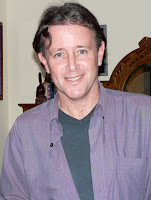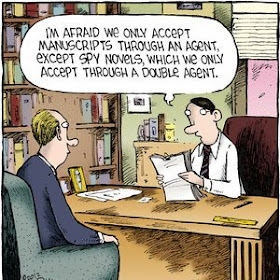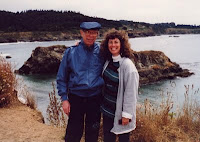 |
| David Dodge in Navy uniform, with wife Elva 1942 |
Today I welcome back
Randal S. Brandt, librarian at
The Bancroft Library, University of California, Berkeley, and the creator of two critically-acclaimed websites:
Golden Gate Mysteries, an annotated bibliography of crime fiction set in the San Francisco Bay Area, and
A David Dodge Companion, chronicling the life and works of mystery writer David Dodge (1910-1974).
This article, A Conversation with Randal S. Brandt, originally appeared in the
Lowestoft Chronicle and is reprinted in its entirety with the permission of Randal S. Brandt and
Lowestoft Chronicle.
Lowestoft Chronicle is an online magazine, published quarterly, featuring fiction, poetry, creative nonfiction, interviews, and artwork, with an emphasis on humor and travel. Website: www.lowestoftchronicle.com
***
In 1998, while helping to clean out a mini-storage space in Walnut
Creek, California, librarian Randal S. Brandt came across the find of
his dreams—a complete, unpublished novel by his favorite author. The
manuscript was
The Last Match by David Dodge, who had died some
twenty-four years earlier, and was hidden away among the papers he had
left to his daughter, Kendal Dodge Butler. Dodge, a popular travel
writer and
The New York Times best-selling author of the travel guide
The Poor Man's Guide to Europe, is best known for his mysteries, two of which have been turned into movies—Glenn Ford took the lead role in
Plunder of the Sun in 1953, and in 1955 Alfred Hitchcock made his novel
To Catch a Thief into a timeless classic starring Cary Grant and Grace Kelly.
After converting the fragile typewritten original to electronic
format, incorporating the author's many corrections and additions, and
correcting typographical errors, Brandt posted a synopsis of the
unpublished novel on his website,
A David Dodge Companion. Eight years later, acclaimed pulp fiction publisher Hard Case Crime would publish the novel, which
Lowestoft Chronicle can testify is a terrific read and a worthy addition to the Dodge canon of work.
This month
Lowestoft Chronicle cornered Randal S.
Brandt, the world's foremost David Dodge chronicler, to find out more
about his ongoing work and learn about his latest discoveries.
Randal, you briefly mention on your website your meeting with
David Dodge's daughter, Kendal Dodge Butler, in 1997. What made you
decide to contact her? You haven't said much about that meeting. How did
it go? Did you discuss How Green Was My Father and How Lost Was My Weekend and her travels with her father?
RSB: If the circumstances of my meeting with Kendal were
described in a novel, no one would believe the incredible coincidences.
My wife and I had been reading David Dodge's books for a couple years
when we happened to notice the phrase "Dead Men Pay No Taxes" in a
column in our newspaper,
The San Francisco Chronicle. The item,
written by columnist Jon Carroll, was about David Dodge's tax
situation—20 years after his death! It mentioned his daughter (this was
how we learned her last name was now Butler) and that she lived in
Walnut Creek, which is a city just 15 miles from where we live in
Berkeley. We looked up her address and wrote her a letter, explaining
that we were fans of her father's books, that we were practically
neighbors, and that we'd love to meet her, if she was so inclined. We
got an enthusiastic message back from her almost immediately and we made
plans to visit her at her home.
Kendal was incredibly gracious. She said that her father always
enjoyed meeting people who liked his books, and that she felt the same
way. She had gotten out some copies of short stories that had been
published in magazines, clippings, and family documents to show us. When
I explained that I was a librarian and that I had been considering
putting together a bibliography of her father, she offered to let me
borrow them. Over the years, Kendal's support for my research never
failed. She generously shared details of her life with her parents with
me and allowed me access to family photographs, correspondence, and
other documents. That's why the website is dedicated to her.
The timing of that meeting turned out to be fortuitous, as well.
It was less than a year later when Kendal decided to retire, sell her
house, and move back to Mexico. We did keep in touch after she moved,
though, and whenever she returned to the Bay Area, we always managed to
arrange a visit.
When you helped Kendal Dodge Butler clear out her storage
space in Walnut Creek did you expect to find unpublished David Dodge
material? Was Kendal aware of the unpublished manuscript? What were your
initial thoughts about The Last Match?
RSB: Honestly, I had no idea of what to expect. Kendal had
indicated that she had papers from her parents, but even she did not
really know what was included. Certainly, I was hopeful that the papers
would yield unpublished material, and I was thrilled to discover a
completed novel and a couple of short stories. The manuscript of
The Last Match
was kind of a mess. It is a typescript carbon copy, on thin paper, with
numerous corrections, additions, and deletions in Dodge's handwriting.
The first thing I did was photocopy it, so that I could handle it
without risking any damage to the original. But, it was pretty tough
reading, with all of the annotations. Kendal wanted a copy, naturally,
so I made the decision to re-type the whole thing, making Dodge's
corrections as I went along. (Of course, this turned out to be a very
fortuitous decision on my part when Hard Case Crime came calling several
years later, but that is another story.) When I first read
The Last Match,
I thought it was a solid novel, but not Dodge's best effort. It has all
of the hallmarks of David Dodge at his best: clear, uncluttered
writing, sparkling dialogue, well-drawn characters, and globe-spanning
settings. It is certainly an obvious attempt to recapture some the magic
of
To Catch a Thief, with a protagonist, "Curly," who is less
than honest, to put it mildly, and a heroine who is beautiful, rich, and
seemingly unattainable to someone like Curly. It also contains a lot of
recycled material, especially from Dodge's travel writing.
In some
ways, though, that makes the novel one of Dodge's most personal (as
Kendal's afterword to the Hard Case Crime edition makes perfectly clear)
and it is a book that grows on you. Kendal's initial reaction to it was
not entirely favorable, and neither was Charles Ardai's (the publisher
of Hard Case Crime), but they both changed their minds about it. I read
it again recently and it does stand up nicely with Dodge's other works.
In terms of that question you're often asked ("Why David
Dodge?"), he's such a good writer that there certainly ought to be a
website dedicated to him, and I'm enormously grateful to you for
providing one. What exactly made you decide to create the website "A
David Dodge Companion" in the first place?
RSB: There are a variety of reasons why I created the website.
The first is that there just isn't that much biographic or bibliographic
information about David Dodge anywhere else. Once I started collecting
this information, I wanted to share it. Naturally, the easiest way to do
that is with a website. Remember, though, that this was in the
mid-1990s, early days of the internet. At the time, I was working in a
small academic branch library at UC Berkeley and was tasked with
creating the first website for my library. The University Library as a
whole was also developing its web presence and had started conducting
classes and workshops for library staff in basic HTML. I attended some
of those classes and got started. Each library staff person was also
given a small amount of personal web space to do with as they pleased. I
used mine to create the first version of the David Dodge website in
1997. It was very, very basic at first—just a listing of Dodge's books,
short stories, and articles. A couple of years later, Kendal's stepson,
Lewis Butler, proposed registering a domain name as a birthday present
for Kendal. So, "A David Dodge Companion" is really a collaborative
effort between Lewis and me. He hosts it and maintains the domain; I
provide the content.
You've said before that your original idea for the
website was a bibliography of Dodge's works. There's an incredible
wealth of information on the site. What made you decide to do so much
research?
RSB: Because it is just so much fun! I am privileged to work in a
world-class library. Although the library does not hold all of Dodge's
books, it does have nearly every journal or magazine that Dodge ever
appeared in and nearly every magazine or newspaper that carried a book
review of Dodge's works. The library also provides access to a multitude
of sources of biographical information, and continues to provide me
with new information all of the time. Most recently, I discovered, via
census data, the addresses of the buildings where Dodge lived in
Berkeley as a young boy. I knew he had been born and spent his childhood
years in Berkeley, but I had no idea where he lived. I found two
different residences for him in Berkeley, along with an address in
Pasadena where he moved with his mother after his father's death.
Coincidentally, one of the Berkeley addresses is an apartment building
right next door to my daughter's orthodontist's office.
Have you read everything David Dodge has had published, and is The Long Escape
your favorite Dodge book? You've said it was the first Dodge book you
read, and has a special place in your heart, but do you think it's his
best work?
RSB: I have to confess that I have not read absolutely
everything. I'm pretty sure that I've collected everything (in
photocopy, if not in the original), but I have not yet read all of the
travel articles that he wrote for
Holiday magazine and other
travel publications. I've certainly read all of his fiction, most of it
multiple times. As for my favorite book, that is a difficult question to
answer. Yes,
The Long Escape is special because it was the
first one, and it certainly does hold up well under numerous readings.
But, I think my favorite of his novels is
Carambola, published
in 1961, which has all of the elements that Dodge perfected: an ordinary
man thrust into an extraordinary situation, hair-raising suspense, and
exotic locations (in this case, Cannes, Barcelona, and the Pyrenees).
Ironically, this book was probably Dodge's biggest financial failure. It
has never been reprinted in the U.S. and has never appeared in a
paperback edition of any kind.
It seems to me that you're the ideal person to write the
David Dodge biography. Has there ever been a biography written about
David Dodge and have you ever considered writing one?
RSB: There is no complete biography of David Dodge, and yes, I
have considered writing one. But, I think that what I really want to
write is a bio-bibliography. Since bibliography is where I started with
this whole thing, it makes the most sense to me. David Dodge's life is
really reflected in his writing. Certainly, his travel books are
incredibly personal—Kendal said she met people throughout her whole life
who expected her to be the precocious five-year old with pigtails that
her father wrote so charmingly about in his books—but you can trace
Dodge's life through his fiction, as well. Dodge was an inveterate
traveler. He was fond of saying that while most writers traveled in
order to gather material to write about, he wrote books in order to fund
further travel. So, I'd like to write an examination of his books and
relate them to his life and travels, and also provide detailed
bibliographical descriptions of each edition of the books. I've even got
a title in mind: "The Poor Man's Guide to David Dodge." Now, I just
have to write it.
 |
| The Dodge family at Stow Lake in Golden Gate Park, San Francisco |
In April of this year you met with Kendal Dodge Butler's
daughter, Kendal. How did the meeting go? What did you find among the
Dodge papers this time?
RSB: Yes, I was honored to be welcomed into the home of Kendal
Reynoso Lukrich and her family. (Kendal was born in Mexico and nicknamed
"Kendalita" in order to distinguish her from her mother. So, for
purposes of clarity, I will adopt her nickname here, as well.) When
Kendal Butler died in 2007, Kendalita went to Mexico and closed up her
mother's house, bringing everything back with her to the U.S. The papers
contain extensive correspondence from both David Dodge and his wife,
Elva, to their daughter and others. Most of this correspondence is from
1971 to 1974, but there are also some earlier letters. These letters
give me a much clearer picture of Dodge at the end of his life. I knew
many of the facts of David and Elva's last years, but this
correspondence fills in a lot of details. Some of those details are
small—for example, I found documentation showing that the exact date of
Dodge's death was August 8, 1974. Previously, I had only known the month
and year; none of the official sources that I had located, like the
Social Security Death Index, gave the exact day. I was also able to
confirm some things that I had only surmised, such as Elva's importance
to David's writing process—he claimed that she was the only living
person who could read his handwriting and especially relied on their
shared memories for his travel writing. Other information was completely
new to me. I'll give you three examples.
1) David Dodge had a contract with a publisher to write a book he
was planning to call either "The Poor Man's Guide to Retirement in
Mexico" or "How Green Was My Grandfather." As Elva's health
deteriorated, however, it became clear that he was not going to be able
to fulfill the contract. The Dodges' best friends in San Miguel de
Allende, Mexico were the science fiction writer Mack Reynolds and his
wife Jeannette. David and Mack considered the possibility of Reynolds
taking over the material and finishing the book (Reynolds also was a
travel writer). Unfortunately, that collaboration never came about and
Dodge eventually returned his advance to the publisher and cancelled the
contract.
2) The 1972 edition of Fodor's Mexico guidebook included an
introduction by David Dodge. Among the papers that I discovered this
time out is a large correspondence file about this introduction. It is
obvious from the letters that there was some miscommunication between
Dodge and Eugene Fodor about the editorial process, but Dodge was very
unhappy with the published version of this introduction. He felt that
the editors had omitted information he considered very important for
tourists and had included things that he did not write (and vehemently
disagreed with). Fodor offered to let him rewrite the introduction, as
long as it remained the same overall length, and the file includes some
revised drafts. Fodor's Mexico guidebooks carried this introduction
through at least 1988; now I need to go look at the published versions
and see if the changes were actually made.
3) For several years in the 1980s, a film option was held on Dodge's first novel
Death and Taxes
by a young, relatively unknown screenwriter and director. The amount of
money involved was negligible, but the director was obviously very
interested in the project. Finally, the option was dropped and nothing
more ever came of it. The director, however, went on to much bigger and
better things; he is now an Academy Award-winning Hollywood A-lister.
We'll never know what could have been …
Kendalita has agreed to place her grandfather's papers in The
Bancroft Library at the University of California, Berkeley. David
Dodge's first series character (and the one most closely modeled on
Dodge, himself), accountant-turned-amateur-sleuth James "Whit" Whitney,
was a "Cal man" and I've long had the impression that Dodge, who was a
high school dropout, always wished that he could have attended his
hometown university. Now, finally, he's been admitted.




































